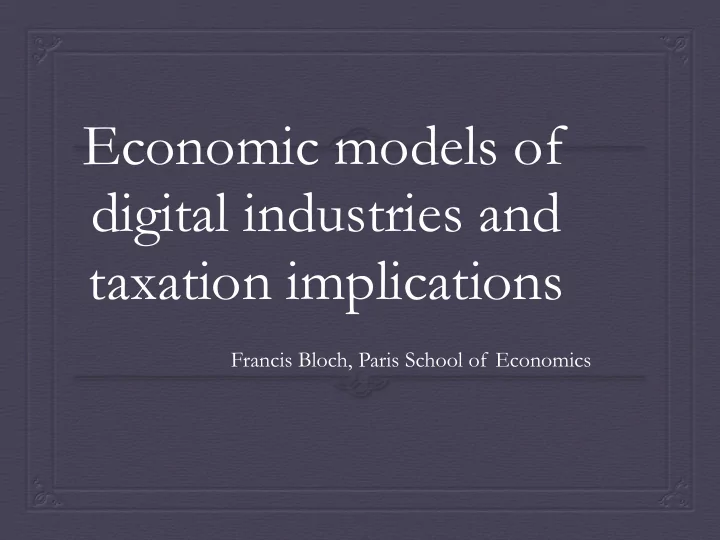

Economic models of digital industries and taxation implications Francis Bloch, Paris School of Economics
An economic study of taxation in digital industries Following the observation that large firms in digital markets pay low taxes on foreign revenues, the need for an economic analysis of taxation in digital industries has emerged. Important studies have been provided by the European Commission, Colin and Collin, the Conseil National du Numérique in France. These studies describe the current situation, propose different fiscal options, and analyze the pros and cons of specific taxations. But they lack a firm grounding on economic analysis. France Stratégie has commissioned a group of economists from Paris School of Economics, Toulouse School of Economics and Telecom ParisTech to provide of taxation in digital industries.
Objectives of the study Provide an economic rationale for optimal taxation in digital industries. Should new specific taxes be put in place, or should existing taxes and tax rules be adapted to account for digital industries? How can the share of the profit of large operators be allocated to different countries? Based on business models in the digital industry, three sub-projects have been defined: VAT and tax distortions taxation on two-sided markets valuation of social and individual data and taxation implications
VAT and tax distortions VAT is not a neutral tax when some operators pay it and others don’t . Heterogeneity in VAT treatment has important consequences on competition, and is a source of unfairness among competitors. It is important to quantify the effects of absence of VAT on digital transactions. Application of VAT along a digital value chain requires a precise computation of value added along the chain which may be problematic.
Taxation on two-sided markets On two-sided markets there are externalities in consumption and participation decisions on the two sides of the market. The taxation on one side and the form of taxation may have important effects on participation on the two sides, and result in market collapse. Both the intensive (how much agents consume) and the extensive (whether agents participate) margins are affected. The effects of taxation on industries with large network effects need to be studied for one-sided and multi-sided markets.
Valuation of social and indiviual data and taxation Individual data and data on the social network are important in order to target advertising, launch and diffuse new products, tailor proposals to customers. Since many platforms make money through the collection and use of individual and social data, the value of the data is important to distribute profits across countries. The analysis of the value created by individual and social data is thus needed to formulate the basis of taxation for multinational platforms operating in different countries.
Recommend
More recommend